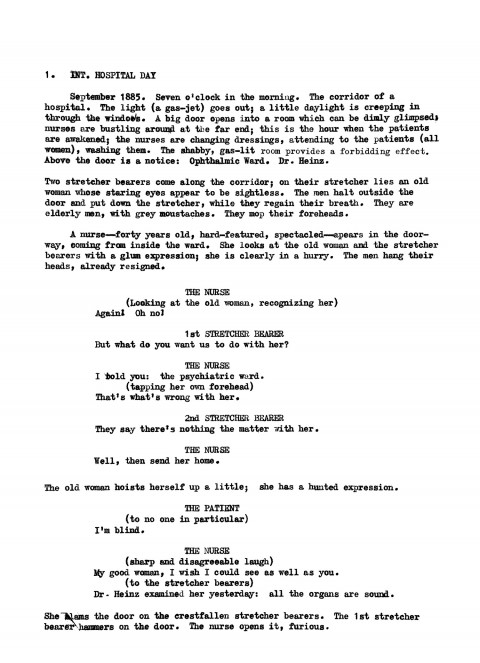In 1958, legendary director John Huston decided to make a film about the life of Sigmund Freud. Having met Jean-Paul Sarte in 1952 during the filming of Moulin Rouge, Huston felt the philosopher would be the ideal person to script the Freud film, since Sartre knew Freud’s work so well and since Huston surmised that he would have “an objective and logical approach.” Despite Sartre’s obvious talents, this still seems like an odd choice on its face, given the specific demands of screenwriting versus philosophical or literary work. But Sartre had some experience writing for the screen by that time—like most literary screenwriters, he’d mostly done it for the money and disavowed most of this work in hindsight–and he loved the movies and respected Huston. The director and the existentialist philosopher also had very similar views of their biographical subject:
Ironically both Sartre and Huston considered themselves anti-Freud for largely the same reason: Sartre because as a Communist he believed the role of the psychoanalyst was limited and of little social importance. For his part Huston felt that psychoanalysis was an indulgence for bored house wives and the problem children of the rich while the “movers and shakers”’ were too busy for it and those that most needed it couldn’t afford it.
Huston and Sartre’s treatment of Freud promised to be critical, but the partnership soon soured due to Sartre’s inability to keep his script at feature length. First, he delivered a modest 95-page treatment. This, however, became a 300-page draft in 1959 that Huston calculated would produce an unacceptable five-hour-long film (see an image from Sartre’s draft screenplay below, and click it to read it in a larger format).
When Huston and Sartre met in person in Galway to find a way to cut the screenplay down to a reasonable length, their working relationship was less than cordial. In Huston’s recollection, Sartre never stopped talking long enough for anyone else to get a word in. The director also remembered that Sartre was “as ugly as a human being can be.” Sartre’s remembrance is hardly more flattering of Huston, if somewhat more comic; he described the director in a letter to his wife Simone de Beauvoir as a pretentious, thoughtless character.…
…in moments of childish vanity, when he puts on a red dinner jacket or rides a horse (not very well) or counts his paintings or tells workmen what to do. Impossible to hold his attention five minutes: he can no longer work, he runs away from thinking.
After their Galway meeting, during which Huston tried and failed to hypnotize Sartre, the philosopher attempted another revision, but this time, he sent Huston an even longer draft, for an eight-hour film. At this point, Huston gave up on Sartre and salvaged what he could, eventually enlisting the help of German screenwriter Wolfgang Reinhardt to finish the script. Huston finally made his Freud film, released in 1962 as Freud: The Secret Passion, with Montgomery Clift as the doctor (see the trailer for the film above).
Unsurprisingly, Sartre had his name removed from the final film. For a fuller account of the meeting of Huston and Sartre, see the second chapter of Elizabeth Roudinesco’s Philosophy in Turbulent Times, where you’ll find other fascinating details like Sartre’s desire to cast Marilyn Monroe as Anna O and Huston’s bemusement at Sartre’s dental hygiene.
Josh Jones is a doctoral candidate in English at Fordham University and a co-founder and former managing editor of Guernica / A Magazine of Arts and Politics.



I would say that although it may seem strange for Sartre to be a screenwriter. Do not also forget that he was a playwright already with his infamous, No Exit, amongst others (and actually the intellectual basis for many contemporary films that can be considered in the “hell is other people” genre).
For my consideration, I think that Sartre was not going to give an objective aspect of Freud. Maybe he wanted to criticize him, but he couldn’t do it in less than 300 pages. Maybe he realized that Freud ideas were so good that he couldn´t accept it and didn´t want to do the script.
point of fact: sartre and beauvoir were never, in any way, “married” and in fact opposed marriage as a bourgeois institution that oppressed women, so referring to her as his “wife” is really unacceptable and betrays an ignorance of their lives, work, and relationship.
Why is this film not available on DVD?